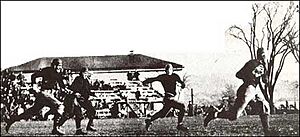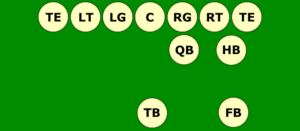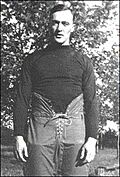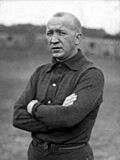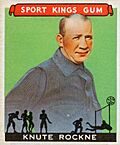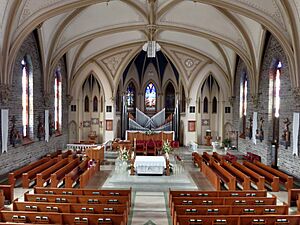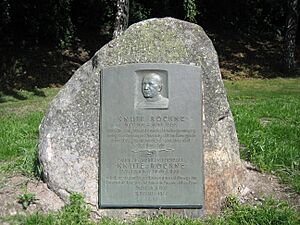Knute Rockne facts for kids
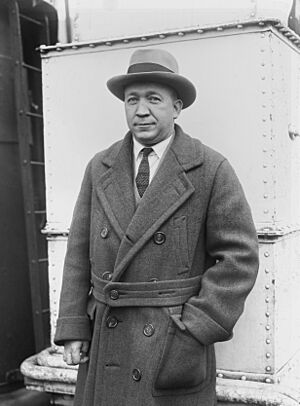 |
|
| Biographical details | |
|---|---|
| Born | March 4, 1888 Voss, Norway |
| Died | March 31, 1931 (aged 43) Bazaar Township, Kansas, U.S. |
| Alma mater | University of Notre Dame |
| Playing career | |
| 1910–1913 | Notre Dame |
| 1914 | Akron Indians |
| 1915 | Fort Wayne Friars |
| 1915–1917 | Massillon Tigers |
| Position(s) | End |
| Coaching career (HC unless noted) | |
| 1914–1917 | Notre Dame (assistant) |
| 1916–1917 | South Bend J. F. C.s |
| 1918–1930 | Notre Dame |
| Administrative career (AD unless noted) | |
| 1918–1931 | Notre Dame |
| Head coaching record | |
| Overall | 105–12–5 |
| Bowls | 1–0 |
| Accomplishments and honors | |
| Championships | |
| 3× National (1924, 1929, 1930) | |
| Awards | |
| Second-team All-American (1913) 2× First-team All-Western (1911, 1913) |
|
| College Football Hall of Fame Inducted in 1951 (profile) |
|
Knute Kenneth Rockne (pronounced kə-NOOT) was a famous American football player and coach. He led the University of Notre Dame football team for 13 seasons. During his time as head coach, Rockne won over 100 games and three national championships.
Many people consider Rockne one of the best coaches in college football history. He was added to the College Football Hall of Fame in 1951. Rockne helped make the forward pass popular and turned the Notre Dame Fighting Irish into a major force in college football. Sadly, Rockne died in a plane crash in 1931 when he was only 43 years old.
Contents
Early Life and Football Beginnings
Knute Rockne was born Knut Larsen Rokne in Voss, Norway. His father was a smith and wagonmaker. When Knute was five, his family moved to Chicago, USA. He grew up in the Logan Square area of Chicago.
Knute learned to play football in his neighborhood. He later played for a local team called the Logan Square Tigers. He went to Lorenz Brentano elementary school and North West Division High School. There, he played football and ran track.
After high school, Rockne worked for four years as a mail dispatcher. He saved enough money to go to college. At age 22, he went to Notre Dame in Indiana. He was an excellent football player there, earning All-American honors in 1913. During the summer of 1913, Rockne also worked as a lifeguard at Cedar Point.
Rockne helped change college football in one important game. On November 1, 1913, Notre Dame played the strong Army team. Notre Dame won 35–13 at West Point. Quarterback Charlie "Gus" Dorais and Rockne led the team. Their offense used both running plays and long, accurate forward passes from Dorais to Rockne. This game showed how powerful the forward pass could be. It was one of the first major games where a team used the forward pass often.
Playing Professional Football
Rockne studied chemistry at Notre Dame and graduated in 1914. He worked as a lab assistant for a while. But he chose to coach football instead. In 1914, he played for the Akron Indians. He played both end and halfback. He and Peggy Parratt used many successful forward pass plays.
In 1915, Knute went to Massillon, Ohio. He played with his former Notre Dame teammate Dorais for the professional Massillon Tigers. Rockne and Dorais brought the forward pass to professional football. They helped the Tigers win the championship in 1915.
Coaching at Notre Dame
Knute Rockne started coaching football teams at Notre Dame in 1912. These were teams from the student dorms, like Corby and Sorin Hall. They played against each other in what were called interhall sports. Even though he later became a famous coach, his record in these early games was 2 wins, 5 losses, and 4 ties.
Rockne became the head coach of the main Notre Dame team in 1918. Over 13 years, he led Notre Dame to 105 wins, 12 losses, and 5 ties. They also won three national championships. Rockne has the highest winning percentage (.881) of any major college football coach. His team used special plays like the Notre Dame Box offense. This play involved players quickly shifting positions just before the ball was snapped.
Rockne also understood that college sports were a form of entertainment. He worked hard to make Notre Dame football popular. He used his charm to get free advertising from newspapers and radio stations. He also promoted products for companies like Studebaker. All his work helped him earn a good income.
Great Seasons and Famous Moments
In 1918, Rockne became the head coach. His team had a record of 3 wins, 1 loss, and 2 ties. His first game was a 26–6 victory against Case Tech. Famous players like George Gipp were on his team. Gipp was great at handling the forward pass.
The 1919 team went undefeated and won a national championship. However, Notre Dame does not officially recognize this championship.
Gipp sadly died on December 14, 1920. He got sick with strep throat and pneumonia. Before he died, he supposedly told Rockne, "Some time, Rock, when the team is up against it... tell them to go in there... and win just one for the Gipper." This famous line would inspire the team later.
The 1921 team had a 10–1 record. Quarterback John Mohardt was excellent at throwing the ball. One writer said the 1921 Notre Dame team was "the first team we know of to build its attack around a forward passing game."
The national champion 1924 team was very famous. It included the "Four Horsemen" backfield: Harry Stuhldreher, Don Miller, Jim Crowley, and Elmer Layden. The team's offensive line was called the "Seven Mules." They had a perfect 10–0 season. They finished by beating Stanford in the Rose Bowl.
Rockne made a big mistake in 1926. Instead of coaching his team against Carnegie Tech, he went to Chicago. He wanted to write newspaper articles about another game. Carnegie Tech used his absence as motivation and won 19–0. This loss likely cost Notre Dame another national title.
On November 10, 1928, Notre Dame was tied with Army at halftime. Rockne reminded his team of Gipp's dying words: "Win one for the Gipper." This inspired the team, and they won the game 12–6. The phrase "Win one for the Gipper" later became a political slogan. Ronald Reagan played Gipp in the 1940 movie Knute Rockne, All American.
Both the 1929 and 1930 teams were undefeated national champions. Rockne thought his 1929 team was his strongest overall.
Personal Life
Rockne met Bonnie Gwendoline Skiles while they both worked at Cedar Point. They got married on July 14, 1914, in Sandusky, Ohio. They had four children: Knute Lars Jr., William Dorias, Mary Jeane, and John Vincent. Rockne became a Catholic on November 20, 1925.
Plane Crash and Its Impact
Knute Rockne died in a plane crash in Kansas on March 31, 1931. He was on his way to help with a movie called The Spirit of Notre Dame. The plane crashed into a wheat field near Bazaar, Kansas. Rockne and seven other people died.
Rockne's death shocked the entire country. President Herbert Hoover called it "a national loss." The King of Norway, Haakon VII of Norway, even honored Rockne after his death. Rockne was buried in South Bend, Indiana. Over 100,000 people lined the streets for his funeral. The funeral was broadcast live on radio across the United States and other parts of the world. In 2024, Rockne was reburied on the Notre Dame campus.
The crash led to big changes in how planes were designed and built. People demanded to know why the plane crashed. Investigators found that the plane's outer skin was glued with a water-based glue. Flying in the rain caused the glue to weaken. This led to parts of the plane breaking off in the air. This disaster helped make air travel much safer around the world.
Legacy and Honors
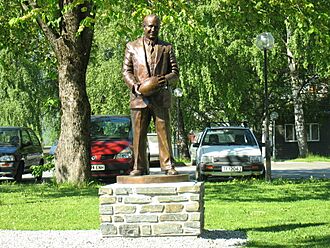
Knute Rockne helped make the forward pass popular in football. While other teams used it before him, he showed how powerful it could be. In the summer of 1913, Rockne and his teammate Gus Dorais practiced passing techniques. They used these in games, with the passer throwing overhand and receivers catching the ball while running.
Their game against Army in 1913 proved how effective the forward pass was. This convinced many coaches to use more passing plays. This game is shown in movies like Knute Rockne, All American.
Coaches Who Played for Rockne
Many players who played for Knute Rockne later became successful coaches themselves. This is called a "coaching tree." Here are some of them:
- Eddie Anderson: coached Iowa
- Hunk Anderson: coached Notre Dame and NC State
- Joe Bach: coached Duquesne and the Pittsburgh Pirates (now Steelers)
- Charlie Bachman: coached Kansas State, Florida, and Michigan State
- Dutch Bergman: coached Catholic and the Washington Redskins
- Frank Carideo: coached Missouri
- Stan Cofall: coached Wake Forest
- Chuck Collins: coached North Carolina
- Jim Crowley: coached Michigan State and Fordham
- Gus Dorais: coached Gonzaga
- Rex Enright: coached South Carolina
- Noble Kizer: coached Purdue
- Curly Lambeau: coached the Green Bay Packers
- Elmer Layden: coached Duquesne and Notre Dame
- Frank Leahy: coached Boston College and Notre Dame
- Tom Lieb: coached Loyola Los Angeles and Florida
- Slip Madigan: coached Saint Mary's and Iowa
- Harry Mehre: coached Georgia and Ole Miss
- Don Miller: was an assistant coach for Georgia Tech and Ohio State
- Edgar Miller: coached Navy
- Chuck Riley: coached New Mexico
- Marchmont Schwartz: coached Creighton and Stanford
- Buck Shaw: coached NC State, Nevada, San Francisco 49ers, and Philadelphia Eagles
- Maurice J. "Clipper" Smith: coached Gonzaga and Villanova
- Harry Stuhldreher: coached Villanova and Wisconsin
- Frank Thomas: coached Alabama
- Adam Walsh: coached Santa Clara and Bowdoin
- Earl Walsh: coached Fordham
- John Weibel: was an assistant coach for Vanderbilt and Duquesne
- Chet A. Wynne: coached Creighton, Auburn, and Kentucky
- Larry Mullins: coached St. Benedict's College, Loyola University of New Orleans, and St. Ambrose University
- Clem Crowe: coached St. Vincent, Xavier, Iowa, Buffalo Bills, Baltimore Colts, Ottawa Rough Riders, and BC Lions
Memorials and Tributes
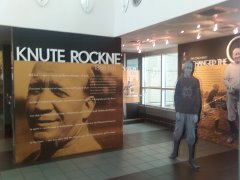
Many places and things honor Knute Rockne:
- Notre Dame has the Knute Rockne Memorial Building, an athletics facility.
- Streets in South Bend, Indiana, and Stevensville, Michigan, are named after him.
- A memorial stands near Bazaar, Kansas, where his plane crashed. It honors Rockne and the others who died.
- In 1941, Allentown Central Catholic High School in Pennsylvania named its gym Rockne Hall.
- The town of Rockne, Texas was named after him in 1931.
- The Studebaker car company sold a "Rockne" car from 1931 to 1933.
- In 1940, actor Pat O'Brien played Rockne in the movie Knute Rockne, All American.
- Rockne was inducted into the College Football Hall of Fame in 1951.
- In 1988, the United States Postal Service released a postage stamp honoring Rockne.
- A bronze statue of Rockne is on the Notre Dame campus.
- He was inducted into the Rose Bowl Hall of Fame in 2014.
Head Coaching Record
| Year | Team | Overall | Bowl/playoffs | ||||||
|---|---|---|---|---|---|---|---|---|---|
| Notre Dame Fighting Irish (Independent) (1918–1930) | |||||||||
| 1918 | Notre Dame | 3–1–2 | |||||||
| 1919 | Notre Dame | 9–0 | |||||||
| 1920 | Notre Dame | 9–0 | |||||||
| 1921 | Notre Dame | 10–1 | |||||||
| 1922 | Notre Dame | 8–1–1 | |||||||
| 1923 | Notre Dame | 9–1 | |||||||
| 1924 | Notre Dame | 10–0 | W Rose | ||||||
| 1925 | Notre Dame | 7–2–1 | |||||||
| 1926 | Notre Dame | 9–1 | |||||||
| 1927 | Notre Dame | 7–1–1 | |||||||
| 1928 | Notre Dame | 5–4 | |||||||
| 1929 | Notre Dame | 9–0 | |||||||
| 1930 | Notre Dame | 10–0 | |||||||
| Notre Dame: | 105–12–5 | ||||||||
| Total: | 105–12–5 | ||||||||
| National championship Conference title Conference division title or championship game berth | |||||||||
See also
- List of teachers portrayed in films
 | DeHart Hubbard |
 | Wilma Rudolph |
 | Jesse Owens |
 | Jackie Joyner-Kersee |
 | Major Taylor |



